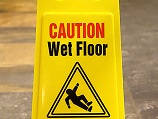
“To hold defendants liable, plaintiff would seemingly impose a duty on defendants to post a weather sentry around the clock to immediately address inclement weather conditions, even when the bank is closed. The law imposes no such duty.”
A late January slip-and-fall case decision that a closed business that takes reasonable steps to clear its lots does do not owe a duty to trespassers in the case of a later snowfall.
On December 10th, 2013 the person who brought the lawsuit claimed to have seriously fractured his ankle as he walked through the parking lot of a local bank branch. He sued the bank, a construction company, and a lawn maintenance company, claiming that they failed to “adequately address the snow and ice conditions in the parking lot.”
According to him, it snowed heavily in the morning of his fall, resulting in what he believed to be five to seven inches of snow, ending at roughly 10 AM. It did not snow again until 8:30 PM that night, which ended by 9:00 PM, with a temperature in the 30s. At 9:00 p.m. he “decided to walk to the nearby Dollar Store…Rather than staying on public sidewalks, plaintiff took his normal route by taking a shortcut across the…Bank parking lot on his way to and from the Dollar Store. It was on his return trip back to his apartment that he slipped and fell in the … parking lot.”
The claimant testified that he saw the lot being plowed, shoveled, and salted after the morning snowfall and that he saw no ice in his path that evening. He further testified that it was difficult to see and that the brief nighttime snowfall had covered underlying ice. The Plaintiff did not stop at the closed bank to use the ATM, nor has he ever been a customer or held an account there. The bank was closed, but the ATM has 24-hour access.
On his nighttime journey back home, he said that he was looking straight ahead and not at the ground because he “really wasn’t looking for anything down there.” Other tenants in his apartment building also use the shortcut, and park their vehicles in the private lot despite the signage that it is only for customers’ use. The lot also has two “No Trespassing” signs.
The bank contracted to have the parking lot monitored for weather events. So a lawn service company employee went to inspect the parking lot at 11:00 PM that night. He described the ground conditions as being wet, and estimated the temperature at 30 degrees.” The defendants in the case claimed that the claimant was a trespasser under the law and was “only entitled to be warned of artificial conditions on the property that pose a risk of death or serious bodily injury.”
He disagreed and said that the defendants knew or should have known that the parking lot was being used as a pedestrian pathway.
The judge who decided the case ruled that the man who fell “was a trespasser when he slipped and fell in the parking lot. He was not in the bank’s parking lot to transact any business with…Bank….Therefore, defendants only had a duty to warn the plaintiff of artificial conditions that pose a risk of death or serious bodily injury. Plaintiff was not injured by an artificial condition on the property.”
In making his decision, the judge referred to the brevity and timing of the nighttime snow; that the person who sued knew about this and chose to walk across anyway; that he was not looking down; that the recent snowfall obscured the underlying ice. “Put simply, defendants had no reasonable opportunity to address the additional snowfall or its impact on any existing ice.” The case was dismissed. Evan Xavier Bakhet is a J.D. Candidate at Rutgers School of Law-Newark with a scheduled graduation date in 2017. He collaborated with me on this blog.

